#First Nations art
Explore tagged Tumblr posts
Text
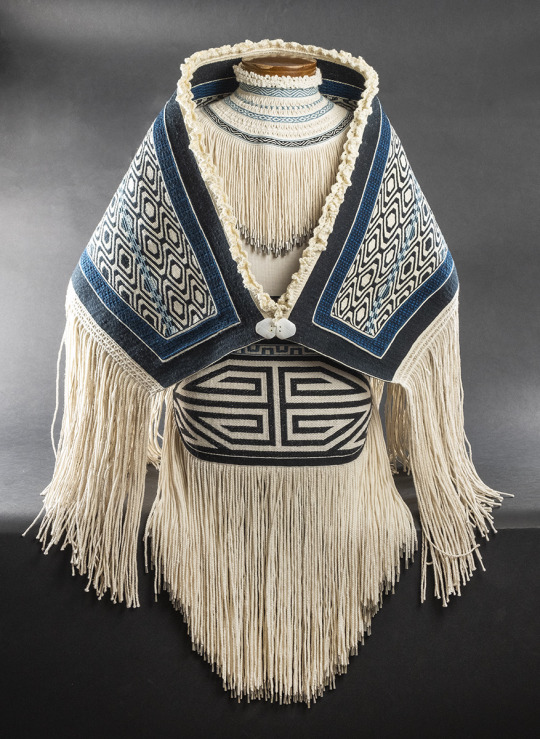
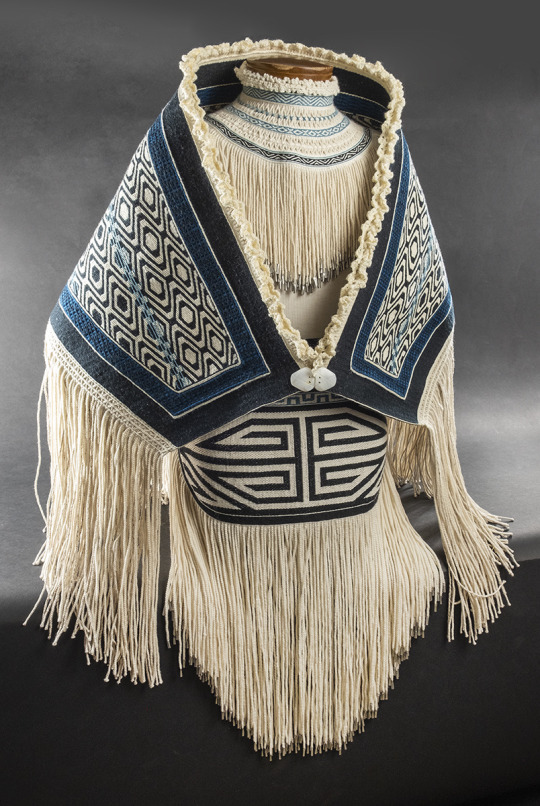
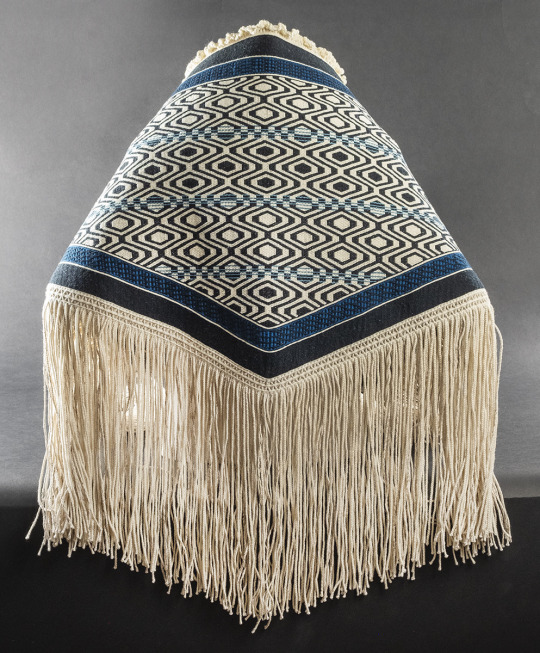
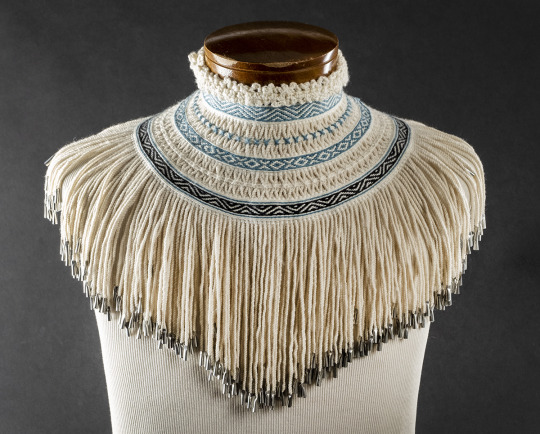
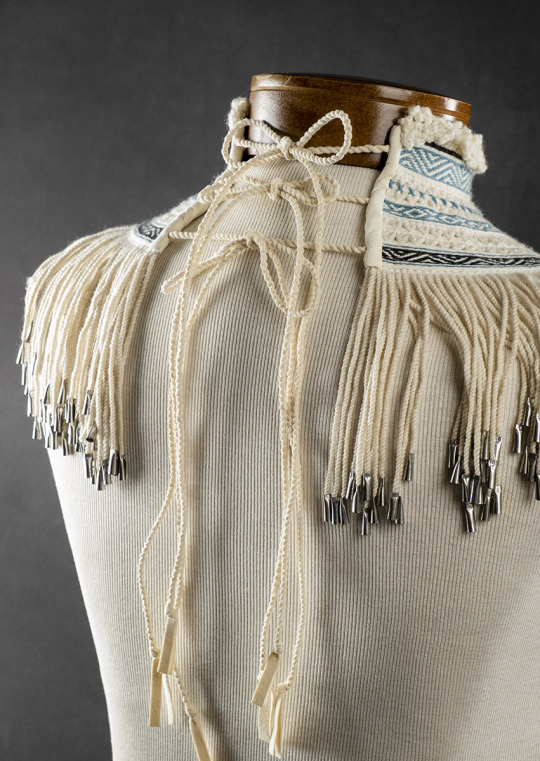
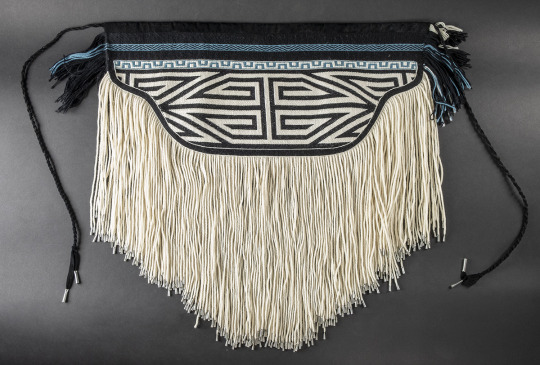
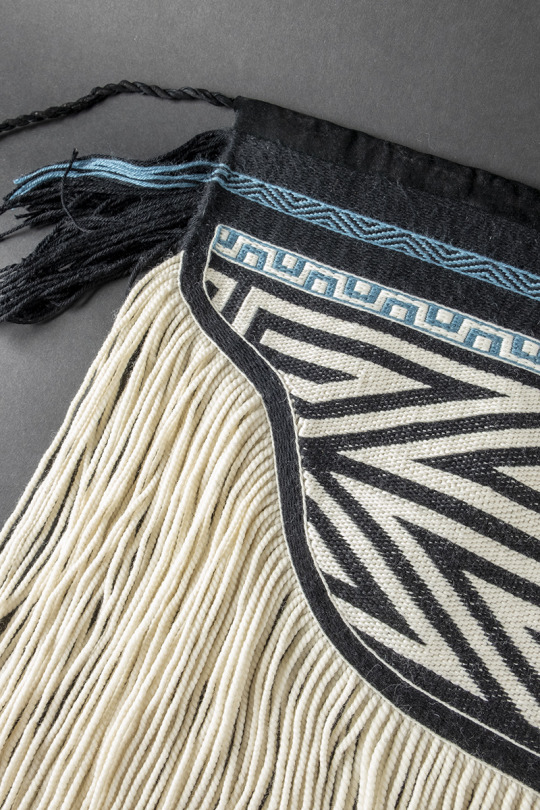
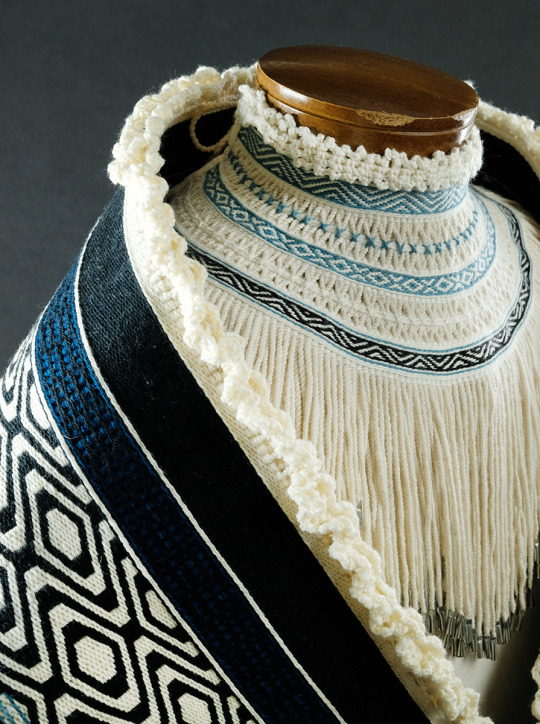

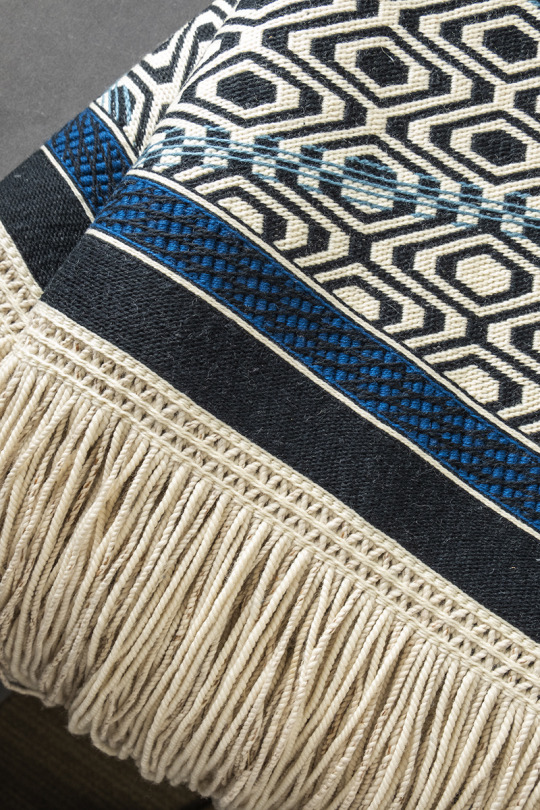
We Are The Ocean
Ursala Hudson (Tlingit/Filipino/German)
collar: merino wool, silk, steel cones, leather. ravenstail patterns, crochet, basketry twining technique. Woman as a Wave shawl: merino wool, silk, cedar bark. chilkat and ravenstail patterns, crochet, basketry twining technique. Tidal apron: merino wool, silk, leather, steel cones. chilkat and ravenstail patterns.
“We Are the Ocean is an ensemble comprised of a collar, apron (entitled Tidal), and shawl (entitled Woman as a Wave). The collar and bottom edge of the shawl are twined using a basketry technique to bring delicacy to the regalia, made specifically to emphasize the wearer’s feminine essence. In place of the sea otter fur that traditionally lines the top of Chilkat and Ravenstail weavings, the merino weft yarns were used to crochet the collar and shawl’s neck lines, bringing forward and incorporating a European craft practiced by both my maternal (Tlingit/Filipino) and paternal (German) grandmothers. The high neck of the collar gives tribute to the Western aesthetics that have forever influenced the Indigenous cultures of our lands; with grace, we embrace that which cannot be undone, and use our new form to be better. The apron’s pattern was studied and graphed from an old Tlingit cedar bark basket, and represents the tides of our lives, as our lessons continue to arise in a revolving cycle, yet made of new debris. The repetitive pattern of the shawl represents the infinite connectedness of our sisters, mothers, aunties, and daughters. Blue lines break up inverted rows, representing the “past,” “present,” and “future,” acknowledging these concepts as irrelevant constructs that fall away when we commune with the Divine. The entire ensemble is worn to evoke the innate spirit of the Woman as an ethereal deity, that resides within us all.”
#textiles#regalia#fiber art#weaving#ursala hudson#tlingit#filipino#indigenous art#native art#first nations art#ndn art
2K notes
·
View notes
Text

Levi Qumaluk (Inuit; Nunavik, 1919-1997) Untitled (Walrus), 1952 Steatite, ivory, 9.4 x 18.7 x 19.7 cm Montreal Museum of Fine Arts 1953.Aa.1
#animals in art#20th century art#Indigenous art#First Nations art#Canadian art#Montreal Museum of Fine Arts#1950s#soapstone#steatite#carving#figure#animal effigy#sculpture#walrus#Arctic animals#marine mammals#Levi Qumaluk#Inuit art
412 notes
·
View notes
Text

Alex Janvier (Canadian/First Nations, 1935-2024), Lubicon, 1988. Acrylic on canvas, 165.2 x 267 cm. Art Gallery of Alberta
260 notes
·
View notes
Text

Carl Ray
Moose
1977
#carl ray#moose#indigenous artist#indigenous art#first nations artist#first nations#first nations art#beautiful animals#nature#wildlife#nature aesthetic#modern art#art history#aesthetictumblr#tumblraesthetic#tumblrpic#tumblrpictures#tumblr art#tumblrstyle#artists on tumblr#aesthetic#tumblrposts
534 notes
·
View notes
Text


Lookin' Good
Lookin’ Good was one of Australia’s first queer First Nations art exhibitions. Hosted in at Boomalli Aboriginal Artists Cooperative in Sydney during Mardi Gras in 1994, the exhibition was curated by Gamilaraay, Wailwan and Biripi artist r e a, Bundjalung artist Matthew Cook, and Wiradjuri and Ngunnawal artist Brook Andrew. To quote Matthew:
The aim of the exhibition is to project a positive image of gays and lesbians within the Koori [south-eastern Australian Aboriginal] community and similarly projecting a positive image of Kooris within the Sydney gay and lesbian community.
The exhibition featured various works by queer Indigenous artists, including Matthew’s jeans (which he’s wearing in the picture), covered with various patches including the Aboriginal flag, and posters by Bundjalung artist Bronwyn Bancroft, exploring Queer Blak men’s experience during the AIDS crisis.
Boomalli has continued to host a queer exhibition as part of Mardi Gras each year, and this year celebrated 30 years of sharing queer, Indigenous art.
Keep an eye on this blog throughout the week as we continue highlighting queer Aboriginal and Torres Strait Islander history and culture for NAIDOC Week.
[Image source]
#naidoc2024#naidoc week#queer art#indigenous art#aboriginal art#first nations art#queer history#first nations history#queer#lgbt#lgbtq
59 notes
·
View notes
Text

Autumnal Owl by Kenojuak Ashevak (1999)
29 notes
·
View notes
Text

The Beautiful NDN SuperMaidens TM Trading Cards; Neckbone Wonderwoman (detail) by Joi T. Arcand as part of the When Raven Became Spider exhibition.
#Joi T. Arcand#Cree#Indigenous Art#First Nations Art#contemporary art#2016#mixed media#beadwork#graphic design#I got to see this in person and the detail to scale is incredible#one of the works I hope they continue a series for
18 notes
·
View notes
Text
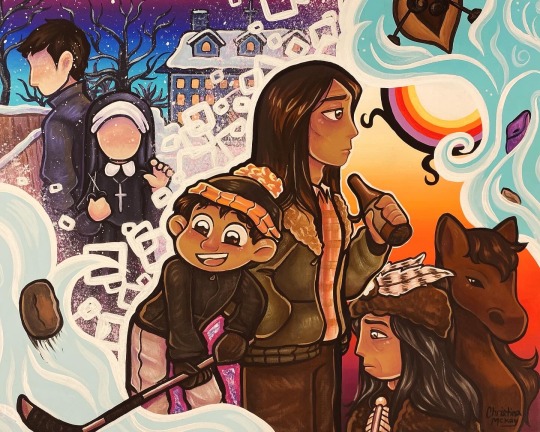
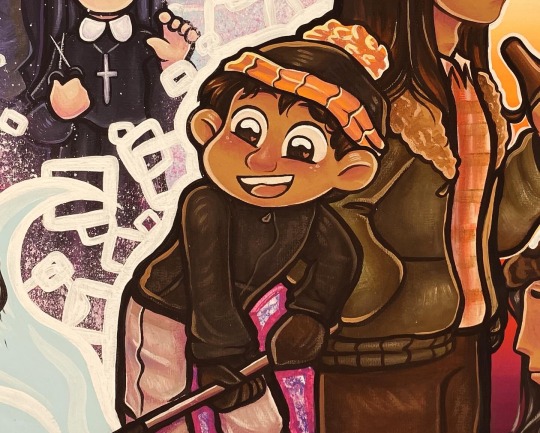
Based of the book “Indian Horse” by Richard Wagamese.
This was all painted by me in acrylic paint, this was for an assignment. There was a bunch of things that I wanted to fix but I had a time limit.
The two characters in the middle are both Saul Indian Horse, the younger and older version.
I painted this all the way back in January.
#There’s a movie too but I suggest reading the book#although I must warn you that it tackles themes like Residental Schools#Indian Horse#richard wagamese#First Nations#Indigenous#indigenous art#First Nations art#artists on tumblr#indigenous artist#art#artwork#illustration#painting#acrylic#acrylic painting#my art
19 notes
·
View notes
Text

Desirai.art for NAIDOC Week 2024
#desirai art#blak artist#blak australia#indigenous art#aboriginal#torres strait islanders#NAIDOC#NAIDOC week#keep the fire burning#aboriginal artist#First Nations art
49 notes
·
View notes
Text

A Little Guy on a Yup'ik harpoon line, c1885-1930!
Little Guy rating: 10/10
Notes: ivory little guy! probably a seal!
#alittleguyaday#ivory carving#yup'ik#first nations#yupik#first nations art#sorry for the absence i was up a mountain#seal
20 notes
·
View notes
Text

Spaced Invaders - 2014
Sonny Assu (Ligwilda'xw Kwakwaka'wakw)
digital intervention on an Emily Carr painting (Heina, 1928)
#sonny assu#kwakwaka’waka#Ligwilda'xw Kwakwaka'wakw#indigenous art#native art#first nations art#ndn art#digital art#emily carr
455 notes
·
View notes
Text
#TwoForTuesday:

Osuitok Ipeelee (Inuit, 1923 – 2005) Untitled (Walruses), c. 1977 Steatite, caribou antler; 29.2 x 37.2 x 21.9 cm Musée des beaux-arts de Montréal inv. 2014.234.1-4
#animals in art#20th century art#Indigenous art#First Nations art#Native American art#Inuit art#Montreal Museum of Fine Arts#1970s#carving#sculpture#figure#walrus#walruses#marine mammal#pair#Two for Tuesday#steatite#soapstone#Osuitok Ipeelee
172 notes
·
View notes
Text

Bill Reid (Haida/Canadian, 1920-1998), Xhuwaji - Haida Grizzly Bear, 1990. Colour silkscreen, 21 1/2 x 21 1/2 in.
584 notes
·
View notes
Text

got a couple pieces of singing tsuchinokou based on the folklore fatty (said lovingly) magical snake

wondering if I could find a way to rig them to sing with them maybe? we'll see it depends on life & health
#art#illustration#yokai#yokai oc#folklore#lamia#naga#イラスト#絵#ツチノコ#gay art#first nations art#native art
10 notes
·
View notes
Text

Carl Ray
Thunderbird in Human Form
1972
#thunderbird#carl ray#indigenous art#indigenous artist#first nations#first nations artist#first nations art#modern art#art history#aesthetictumblr#tumblraesthetic#tumblrpic#tumblrpictures#tumblr art#tumblrstyle#artists on tumblr#aesthetic#tumblrposts#nature#nature aesthetic
66 notes
·
View notes
Text





Bubonic Plague | Influenza | Measles | Whooping Cough | Typhoid
Excerpts from First Nations artist Ruth Cuthand's Trading series of traditionally beaded micrographs.
#art#ruth cuthand#first nations art#indigenous art#quillwork#beading#science#disease#medicine#colonialism
16 notes
·
View notes